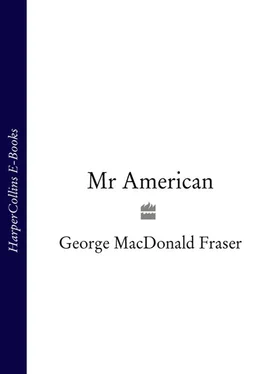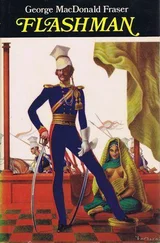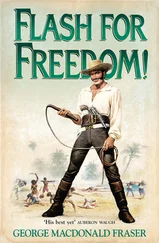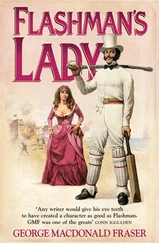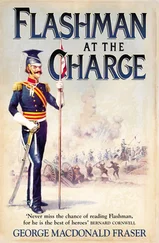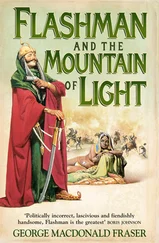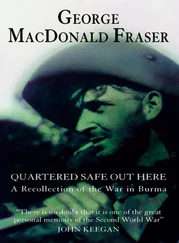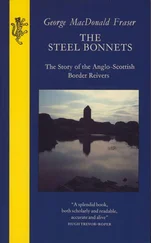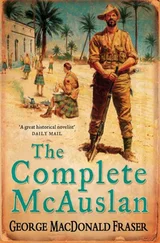They halted outside the inn, and Mr Franklin asked if the man could direct him to Lancing Manor. The man stared in silence for a moment, and then, in a broad drawl which Mr Franklin found surprisingly easy to understand, said:
“’Arf a mile down the road.” His eyes roved over Mr Franklin and the bags in the gig, and he added: “Ain’t nobody ’ome.”
Mr Franklin thanked him, and they drove on, through the village and along a winding way between high hedges, until they came to a pair of lichened stone gate-posts under the trees, and two large rusty gates chained and padlocked. Mr Franklin got down, took a bunch of keys from his pocket, and after some exertion, unlocked the gates and pushed them open. The narrow drive was high with weeds and rank grass, so he ordered the boy to help him down with his baggage in the gateway; he would not need the gig any longer, he said, and presented the urchin with half a crown.
The boy considered the coin, and then looked at Mr Franklin, standing beside the trunks and valise, and at the tree-shaded pathway. He addressed his passenger for the second time in two hours.
“Ain’t nobody ’ome,” he said, echoing the labourer, and Mr Franklin smiled.
“There is now,” he said, and with a nod to the staring boy, walked up the drive. He was aware that his heart was beating as he pushed his feet through the rustling grass, and that he was walking unduly quickly; then he rounded a bend under the trees, and stopped suddenly as a house came into view. For a full minute he stood looking at it. Then:
“I must have been out of my mind,” he said aloud. Then he took off his hat and looked around him. Finally he said: “No, I wasn’t, either,” and walked towards the house.
Mr Franklin had no romantic notions of what a manor ought to look like, so where another might have expected mullioned windows, crenellations, and half-timbering, he accepted without a second thought the solid, unpretentious Georgian structure which could hardly have been over a hundred and fifty years old. It was, in fact, rather a fine house, built on an Elizabethan site, its shuttered windows precisely spaced on either side of a massive, pillared porch. The broad gravel sweep before it was sadly overgrown, and the lawn to his right was a tangle of rank grass and fox-gloves, but even he could see that the structure was sound and the roof good, and the beeches and chestnuts which surrounded it on three sides were nothing short of magnificent. “Beautifully matured grounds of nearly two acres”, the estate agent had said; sure enough, thought Mr Franklin, it’s mature.
There was a little fountain in the middle of the gravel sweep, lichened and full of leaves, and two heavy stone seats, one on either side of the porch. Mr Franklin paused with his back to the front door, surveying the tangle of sweep, lawn and drive and the trees which screened him from the road; the air was full of the still hum of the late autumn afternoon, broken only by the occasional murmur of pigeons behind the house. His hand was shaking as he fumbled the key into the big lock.
Inside it was cool and dim, and slightly chill from a year’s emptiness. The hall was surprisingly spacious, with a stairway curving gracefully upwards, and doors opening on either side into the main reception rooms. “A delightful Georgian residence, charming woodland situation, three reception, four bed, bathroom with patent water-heater, panelled hall and lounge, expensively fitted, every convenience, kitchen garden …” Well, here it was, and the agent had been as good as his word; it was an admirable house and would plainly have been snapped up long ago if it had been more convenient for the outside world. But the agent understood that Mr Franklin was not concerned with that; quite the contrary, in fact.
The American made his way from room to room, taking his time. It was larger than he had expected, for the agent had made nothing of the servants’ quarters, which consisted of two small rooms at the back, off the low, flagged kitchen. There was running water – cut off for the moment – but no electricity, of course, and no gas. Behind the house was the promised kitchen garden, and a small orchard, heavy with the famous Norfolk apples. Mr Franklin picked a couple and ate them as he surveyed the small coach house and stabling for two horses. All was overgrown, but not seriously; the timber stood at a good distance from the house itself, and all was enclosed by a stout ivy-covered wall.
Mr Franklin returned inside, having hauled his baggage up from the front gate, and stood in the hall, finishing his second apple, glancing round in the satisfaction of possession. It was strange, unreal almost, but it filled him with a quiet content; he took off his hat and was about to hang it on the newel post when he stopped himself, smiling, and laid it instead on the settle which stood to one side of the empty fireplace. When in England, he thought … and I am in England, in Castle Lancing and the County of Norfolk, and it’s been a long, long haul. Three hundred years, give or take a little, and who’d ever have thought it? Long way from Tonopah, but a sight easier to come back from than it must have been to get to.
Mr Franklin ranged his baggage beside the settle, picked up his hat again, and left the house.
By that time, of course, every soul in the village of Castle Lancing, pop. 167, knew that there was a new occupant at the manor. The carrier’s boy, refreshing himself at the Apple Tree from Mr Franklin’s half-crown, had spread the word of the arrival, and opined that he was a big-game hunter and definitely not from Norfolk – Lincoln, maybe. He was silent, and rich, from the cut of his duds, but by the look of his bags he’d come a powerful long way. This was sensation, and by the time Mr Franklin, in his eccentrically broad-brimmed hat and dark suit, had reached the village green, Castle Lancing was fairly agog. Curious eyes watched from the doorways, children were hushed, the labourers on the bench outside the Apple Tree suspended their pints and observed in silence the rangy figure swinging up the dusty street, and the landlord cuffed the carrier’s boy and remarked derisively:
“He’s never from bloody Lincolnshire. He’s furrin.”
Mr Franklin was observed to go into the village shop, and five minutes later the news was winging that he had bought a loaf, two tines of corned beef, butter, coffee, a tin of pears, half a dozen boxes of matches, and a tin of paraffin, which he had asked to have left at the manor’s back door. The proprietress, Mrs Laker, had been quite overcome, not least by the fact that the newcomer had made his purchases with a sovereign, dismissing the change and politely asking her to credit it to his account. The prospect of trade thus opened up caused her to sit down, panting, and observing to Mrs Wood, from the dairy, that she’d never been so took aback in her life, and if Mrs Wood was wise, she’d see there was a pint of milk at the manor’s door, too.
Meanwhile, the Apple Tree had been stricken to silence by Mr Franklin’s arrival and request for a glass of beer. Surprised grunts had greeted his “good evening” as he passed the labourers’ bench, and as he stood in the little tap-room, sipping his drink and surveying the collection of horse-brasses behind the bar, the landlord, Mr Herbert, polished glasses with unusual energy, chivvied away those of his offspring who were peering at the prodigy from the back parlour, and maintained a painful silence. Gradually, with heavy nonchalance, the occupants of the bench drifted within and sat down, and after a decent interval began to converse quietly among themselves. Mr Franklin ordered a second glass of beer, and conversation died. He drank it, slowly, but otherwise quite normally, and the muted talk began again, until he turned round, smiled amiably at the small gathering, and asked if anyone would care for a drink.
Читать дальше
